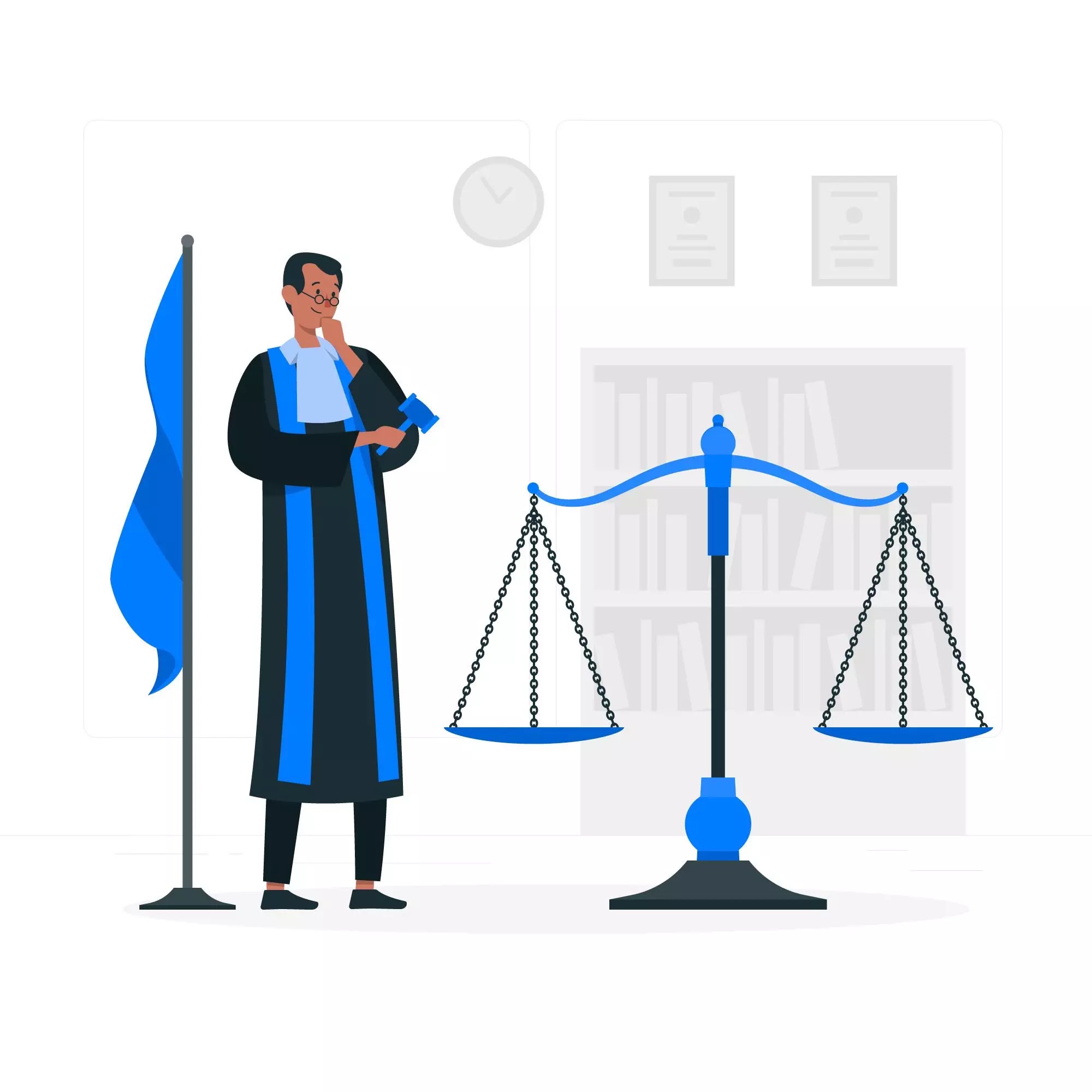Legal Limitation on the Power of Judiciary to Declare a Law Unconstitutional
Legal Limitation on the Power of Judiciary to Declare a Law Unconstitutional
Introduction
The power of the judiciary to declare a law unconstitutional is also
known as judicial review. It is the power and duty of the courts to examine the validity
of legislative and executive acts about the Constitution and to
declare them void if they are found to be inconsistent with it.
Judicial review is an essential feature of a constitutional democracy that aims
to protect the fundamental rights of the citizens and to maintain the balance
of power between the union and the states.
However, judicial review is not an unlimited or arbitrary power.
It is subject to certain legal limitations that are derived from the
Constitution itself, the doctrine of separation of powers, the principle of
federalism, and the rule of law. These limitations are meant to preserve the
legitimacy and authority of the judiciary as well as to respect the sovereignty
of the parliament and the will of the people. In this article, we will discuss
some of these limitations and illustrate them with examples from Indian
constitutional jurisprudence.
Legal Limitations on Judicial Review
Constitutional Provisions
The first and foremost limitation of judicial review is the
Constitution itself. The judiciary cannot declare a law unconstitutional unless
it violates a specific provision of the Constitution. The constitution is the
supreme law of the land and it defines and delimits the powers and functions of
every organ of the state, including the parliament and the judiciary.
Therefore, judicial review is not a power to override or amend the
Constitution, but to uphold and enforce it.
For example, Article 13 of the Indian Constitution declares that
any law that infringes upon the fundamental rights guaranteed in Part III of
the Constitution shall be void to the extent of such infringement. Therefore,
if a law violates any fundamental right, such as freedom of speech, equality
before the law, or right to life, the judiciary can strike it down as
unconstitutional. However, if a law does not violate any fundamental right, but
only affects some other constitutional or legal right, such as property rights,
citizenship rights, or contractual rights, then the judiciary cannot declare it
unconstitutional on that ground alone.
Another example is Article 368 of the Indian Constitution, which
empowers the parliament to amend any part of the constitution by following a
special procedure. However, this power is not absolute, as it is subject to two
limitations: (a) it cannot alter or destroy the basic structure or essential
features of the Constitution; and (b) it cannot abridge or take away any
fundamental right. Therefore, if a constitutional amendment violates either of
these limitations, then the judiciary can declare it unconstitutional.
Separation of Powers
The second limitation of judicial review is the doctrine of
separation of powers. This doctrine implies that each branch of government -
legislative, executive, and judicial - has its own distinct sphere of authority
and responsibility and that none should encroach upon or interfere with
another’s functions. The doctrine aims to prevent concentration and abuse of
power by any one branch and to ensure checks and balances among them.
Therefore, judicial review is not a power to legislate or govern,
but to interpret and apply the law. The judiciary cannot substitute its own
policy preferences or value judgments for those of the parliament or the
executive. The judiciary cannot declare a law unconstitutional merely because
it considers it unreasonable, unjust, or unwise. The judiciary can only examine
whether a law is consistent with the Constitution and other laws.
For example, in S.R. Bommai v. Union of India, the Supreme Court
held that judicial review of presidential proclamation under Article 356
(imposing president’s rule in a state) is limited to examining whether there
was any material or relevant ground for invoking such power. The court cannot
go into the merits or demerits of such action or question its political wisdom
or expediency.
Another example is Keshavananda Bharati v. State of Kerala, where
the Supreme Court held that judicial review of constitutional amendments is
limited to examining whether they violate or alter the basic structure or
essential features of the constitution. The court cannot go into the policy
objectives or social benefits of such amendments or question their political
necessity or desirability.
Federalism
The third limitation of judicial review is the principle of
federalism. This principle implies that India is a union of states that have
their own autonomy and identity within the framework of the constitution. The
constitution distributes legislative powers between the union and the states
through three lists: union list, state list, and concurrent list. The union
parliament can make laws on the subjects in the union list and the concurrent
list, while the state legislatures can make laws on the subjects in the state
list and the concurrent list. However, in case of a conflict between a union
law and a state law on the same subject in the concurrent list, the union law
prevails.
Therefore, judicial review is not a power to favour or disfavour any
level of government, but to maintain the balance of power and harmony between
them. The judiciary cannot declare a law unconstitutional merely because it
affects the interests or rights of a state or a region. The judiciary can only
examine whether a law is within the competence and scope of the legislature
that enacted it and whether it is consistent with the constitutional scheme of
federalism.
For example, in State of West Bengal v. Union of India, the
Supreme Court upheld the validity of the Coal Bearing Areas (Acquisition and
Development) Act, 1957, which empowered the union government to acquire
coal-bearing lands in any state for public purposes. The court rejected the
argument of the state of West Bengal that the act violated its right to
property and its legislative power over land and minerals. The court held that
the act was within the legislative competence of the union parliament under
Entry 54 of List I (regulation of mines and mineral development) and that it
did not infringe upon the federal structure of the constitution.
Another example is State of Karnataka v. Union of India, where the
Supreme Court upheld the validity of the Cauvery Water Disputes Tribunal Award,
which allocated water from the Cauvery River among four states: Karnataka,
Tamil Nadu, Kerala, and Pondicherry. The court rejected the argument of
Karnataka that the award violated its right to water and its legislative power
over-irrigation and water supply. The court held that the award was within the
constitutional authority of the tribunal under Article 262 (adjudication of
inter-state water disputes) and that it did not disturb the federal equilibrium
of the constitution.
Rule of Law
The fourth limitation of judicial review is the rule of law. This
rule implies that India is a constitutional democracy that is governed by laws
and not by men. The constitution is the supreme law of the land and it binds
all authorities and individuals within its territory. The Constitution also
guarantees certain fundamental rights and freedoms to all citizens and imposes
certain duties and obligations on them. The constitution also establishes an
independent and impartial judiciary as the guardian and interpreter of the
constitution and other laws.
Therefore, judicial review is not a power to act arbitrarily or
capriciously but to act fairly and reasonably. The judiciary cannot declare a
law unconstitutional without giving proper reasons and grounds for its
decision. The judiciary cannot declare a law unconstitutional without following
due process of law and natural justice. The judiciary cannot declare a law
unconstitutional without respecting the rights and interests of all parties
involved.
For example, in Maneka Gandhi v. Union of India, the Supreme Court
held that judicial review of executive action under Article 21 (right to life
and personal liberty) is not confined to examining whether such action is
authorized by law, but also whether such law is fair, just, and reasonable. The
court also held that judicial review of executive action under Article 21
requires allowing being heard and making representations against
such action.
Another example is Indira Nehru Gandhi v. Raj Narain, where the
Supreme Court held that judicial review of election disputes under Article 329
(bar to interference by courts in electoral matters) is not excluded by any
constitutional amendment or statute, but only by a valid exercise of
constituent power. The court also held that judicial review of election
disputes under Article 329 requires giving effect to the basic structure or
essential features of the constitution, such as democracy, free and fair
elections, rule of law, and separation of powers.
Conclusion
Judicial review is a vital power of the judiciary to uphold and enforce the Constitution and other laws. However, it is not an unlimited or arbitrary power. It is subject to certain legal limitations that are derived from the Constitution itself, the doctrine of separation of powers, the principle of federalism, and the rule of law. These limitations are meant to preserve the legitimacy and authority of the judiciary as well as to respect the sovereignty of the parliament and the will of the people.












Comments
Post a Comment
Thanks, For Your Valuable Comment